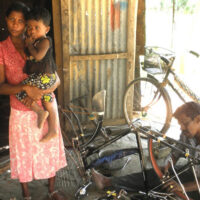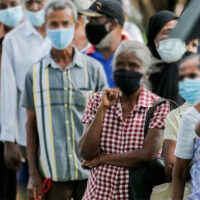Crisis-Driven Migration or Something More? Decent Work Deficits and the Migration of Health Workers from Sri Lanka
By Chandima Arambepola
Sri Lanka’s ongoing economic crisis has yet again highlighted the importance of migration as a coping strategy. Research by the Centre for Poverty Analysis (CEPA) has established that migration – either to the urban centres or overseas – acts as an effective coping mechanism allowing individuals to pull themselves out of poverty. However, as policy and public discussions in the past year have highlighted, the contemporary fear tends to highlight the crisis-driven loss of skilled workers and the resultant brain drain in Sri Lanka. Framed as a loss to the economy, these discussions fail to consider how access to decent work and lack of recognition also contribute towards shaping workers’ decisions to migrate, regardless of the presence of a crisis.
A report by the ILO, based on interviews conducted with health workers by CEPA during the latter part of 2021 and early months of 2022, points to the shortcomings of using a purely economic lens to assess the loss and gain from migration. Rather, interviews with a range of health workers – doctors, nurses, technicians – paint a complex picture of work-lives in the health sector. The evidence suggests that migration of health workers was marked by not merely discontent over wages but also factors related to lack of decent work. While the numbers of health workers choosing to migrate may have increased as a result of the economic instability in Sri Lanka, the commonality of experiences across multiple skill levels and jobs suggest that health workers in the public sector will continue to migrate.
Decent working conditions?
For all health workers, who have chosen to migrate or wished to, comparatively higher wages is a very strong incentive. Both doctors and nurses were found to use the leave of absence option to migrate to the Middle East and South-East Asia. Despite the professional setbacks their absence results in, these sojourns give the professionals and their families living in Sri Lanka, long-term financial stability. Pointing to familial and cultural expectations woven into Sri Lankan culture, some workers also cited their ability to provide more sustained support to their extended families as well as the community as a result of migration.
While the wages earned overseas are comparatively higher than Sri Lanka, the workers may only earn average wages in the countries of destination. However, these wages are adequate to lead a decent life without adding extra pressure on the workers to assume a second job or extend working hours to supplement their main income. As some workers pointed out, reaching a decent standard of living is not within everyone’s reach in Sri Lanka’s public health sector; where possible, this entails ‘moonlighting’ in the private sector and extending their workdays in unsustainable ways.
In Sri Lanka’s health sector, for lower-skilled health workers in particular, working overtime becomes a necessity, a response to lower wages. For doctors, this means maintaining a private practice which would extend their workday to 12-14 hours. For others, staff shortages make it difficult to manage their overtime hours or secure a leave of absence for studies. For young families where both parents are employed in the health sector, the pressures to juggle work and personal lives is intense, resulting in the reliance of domestic helpers and/or grandparents to assume the primary care responsibilities of their children.
In contrast, the flexible working arrangements that allow for workers to balance their care responsibilities and work alongside the mandatory breaks and limits to working hours that are legally adhered to, were cited as benefits in overseas health sectors. Comparative higher wages therefore, also came with less work-related stress. The working conditions and working hours were considered decent, allowing these workers to spend more ‘quality’ time with their families and especially be more involved in their children’s lives. The ability to maintain a semblance of a decent work-life balance was highlighted by many as a strong incentive to migrate. Younger workers were able to consider further studies or engage in extra-curricular activities that were not possible in Sri Lanka due to long hours spent commuting to work in combination with the long working hours.
Dignity of labour
Health workers who are not medical officers voiced a strong sense of being treated as ‘less than’ medical officers. The frustration stems from the perceived lack of recognition accorded to their qualifications and being side-lined in assuming a more central role in patient care as well as in administrative roles. In contrast, health workers including nurses employed overseas point to management of patient care as a collective responsibility and the sense that their inputs are not only valued but expected. This perception of being sidelined is further exacerbated by the marked absence of these groups of health professionals in public health administration and policy discussions.
In general, health workers struggle to deal with these contradictions weaved into the public health sector. The health sector itself is seen as performing an important role with the workers placed within a system that seeks to support as many patients as possible, even when it is resource-poor. This feeling of doing a ‘service’ contributes to the sense of job satisfaction amongst all workers. But such feelings can only go so far to compensate for a continuous stressful work environment. Underlying tensions around lack of decent working conditions, lack of due recognition of skills and qualifications and opacity in how decisions are made, act as powerful factors that may, when combined or working in tandem, push workers to seek employment elsewhere.
For a health sector struggling to survive during Sri Lanka’s worst economic crisis, improving the working conditions of its workforce would not be chief amongst its priorities. However, the study points to a growing discontent at the core of the health sector, where the same discourse around highly skilled and less skilled workers result in the marginalisation of a majority of the health workforce. These fundamental concerns must be addressed in the long-term for two reasons: it benefits the health sector as a whole when different workers’ contributions are duly recognised and leads to the improvement in the quality of care provided to patients. On the other hand, even if Sri Lanka finds its way out from this economic crisis, failing to address decent work deficits in the public health sector will lead to the continued leakage of a trained workforce from Sri Lanka. Given the demand for trained health workers from neighbouring and competing markets, addressing decent work concerns appears the lesser of two evils.
This article is based on findings from a study undertaken on behalf of ILO entitled Framework for Sri Lanka’s health workers’ mobility: adopting fair and ethical recruitment practices which can be accessed via https://www.ilo.org/wcmsp5/groups/public/—asia/—ro-bangkok/—ilo-colombo/documents/publication/wcms_876322.pdf









